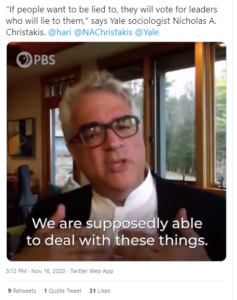What is a Cult? Descriptions from Cult Education Institute
There's a lot of accusations that Americans on both the political right and left are now members of "Cults." What exactly is a cult? After doing a bit of research, I found these helpful descriptions / definitions / traits of Cult Leaders and their followers from the Cult Education Institute. The following material is from the CEI webpage titled "Warning Signs":
Ten warning signs of a potentially unsafe group/leader.
- Absolute authoritarianism without meaningful accountability.
- No tolerance for questions or critical inquiry.
- No meaningful financial disclosure regarding budget, expenses such as an independently audited financial statement.
- Unreasonable fear about the outside world, such as impending catastrophe, evil conspiracies and persecutions.
- There is no legitimate reason to leave, former followers are always wrong in leaving, negative or even evil.
- Former members often relate the same stories of abuse and reflect a similar pattern of grievances.
- There are records, books, news articles, or television programs that document the abuses of the group/leader.
- Followers feel they can never be "good enough".
- The group/leader is always right.
- The group/leader is the exclusive means of knowing "truth" or receiving validation, no other process of discovery is really acceptable or credible.
Ten warning signs regarding people involved in/with a potentially unsafe group/leader.
- Extreme obsessiveness regarding the group/leader resulting in the exclusion of almost every practical consideration.
- Individual identity, the group, the leader and/or God as distinct and separate categories of existence become increasingly blurred. Instead, in the follower's mind these identities become substantially and increasingly fused--as that person's involvement with the group/leader continues and deepens.
- Whenever the group/leader is criticized or questioned it is characterized as "persecution".
- Uncharacteristically stilted and seemingly programmed conversation and mannerisms, cloning of the group/leader in personal behavior.
- Dependency upon the group/leader for problem solving, solutions, and definitions without meaningful reflective thought. A seeming inability to think independently or analyze situations without group/leader involvement.
- Hyperactivity centered on the group/leader agenda, which seems to supercede any personal goals or individual interests.
- A dramatic loss of spontaneity and sense of humor.
- Increasing isolation from family and old friends unless they demonstrate an interest in the group/leader.
- Anything the group/leader does can be justified no matter how harsh or harmful.
- Former followers are at best-considered negative or worse evil and under bad influences. They can not be trusted and personal contact is avoided.

